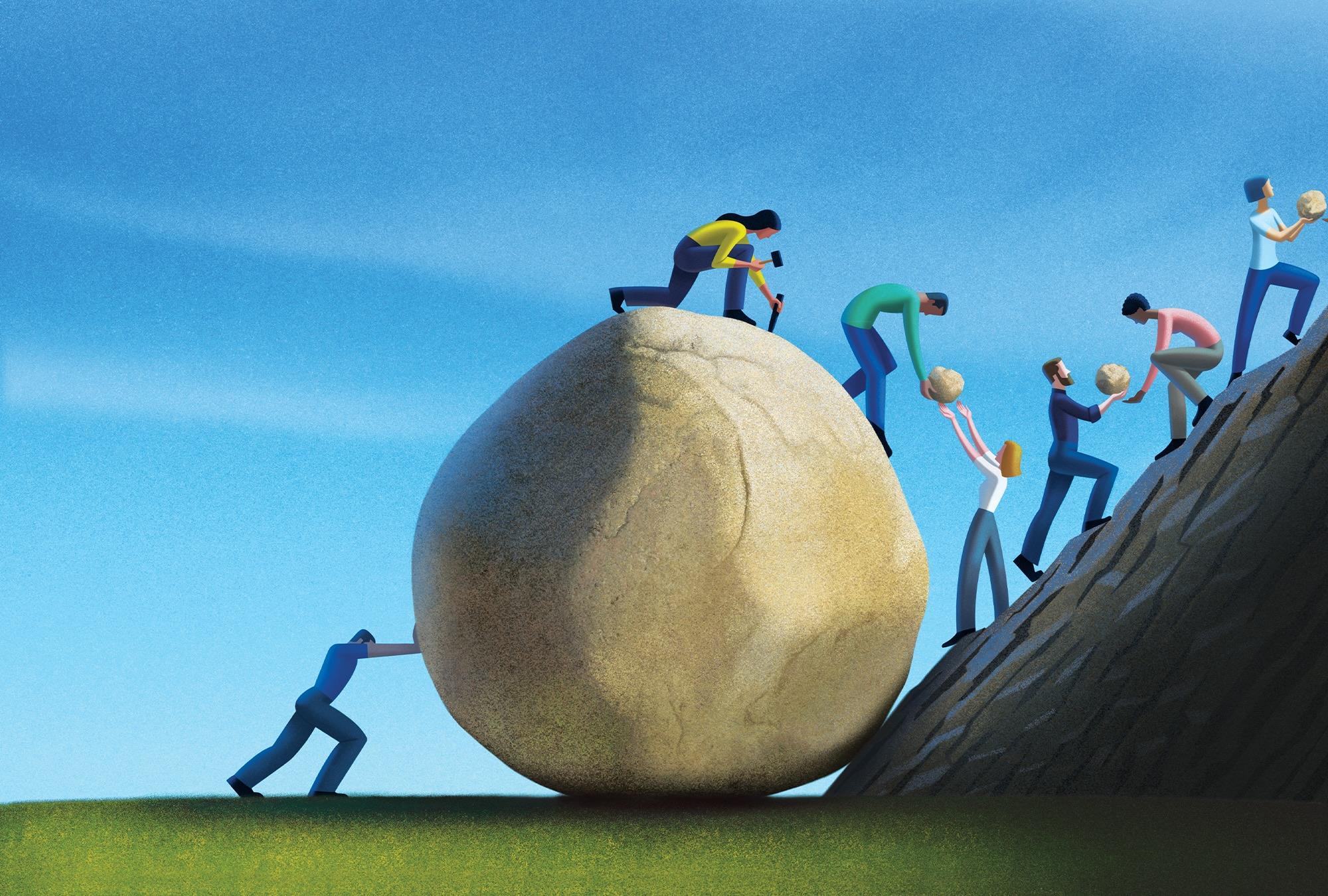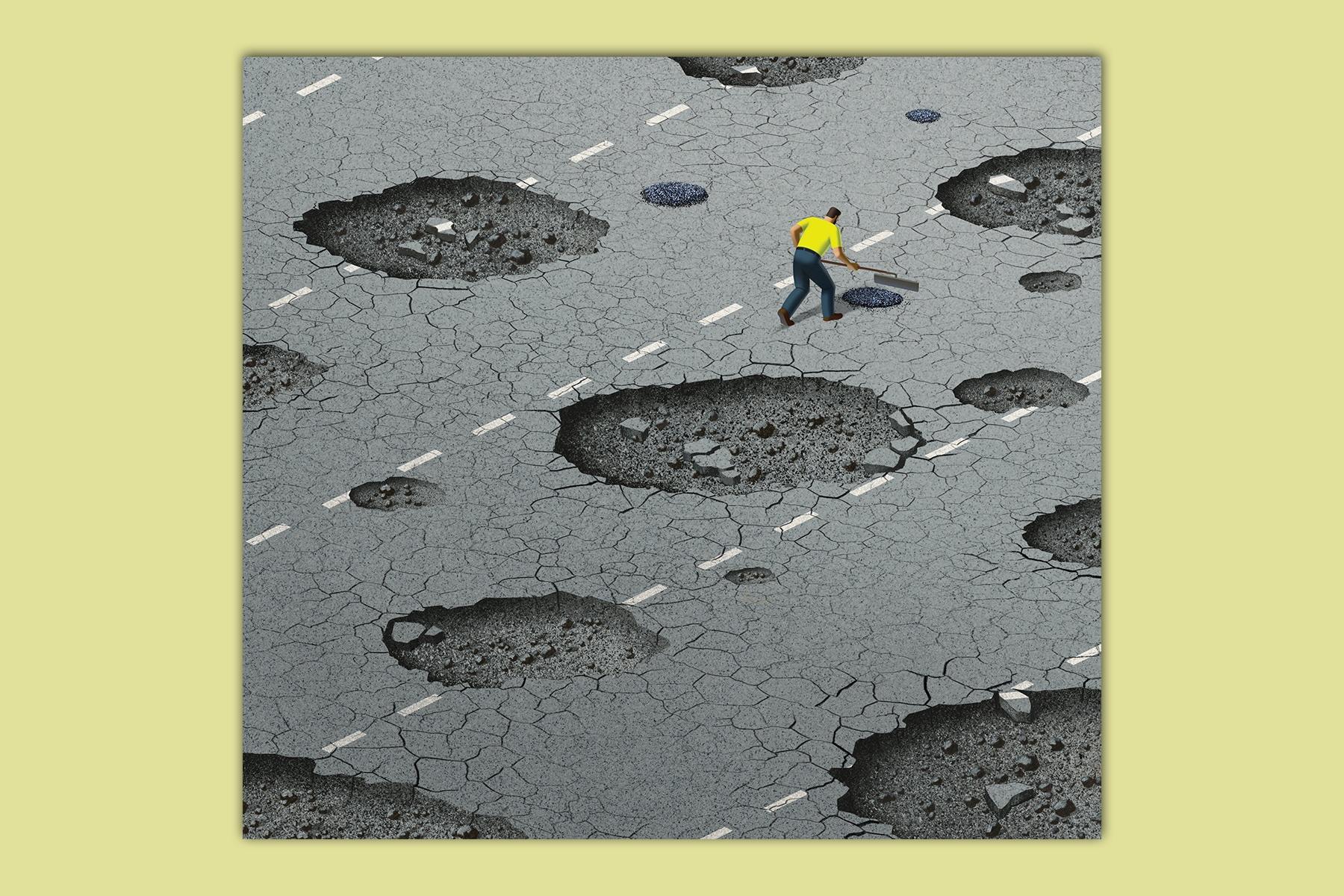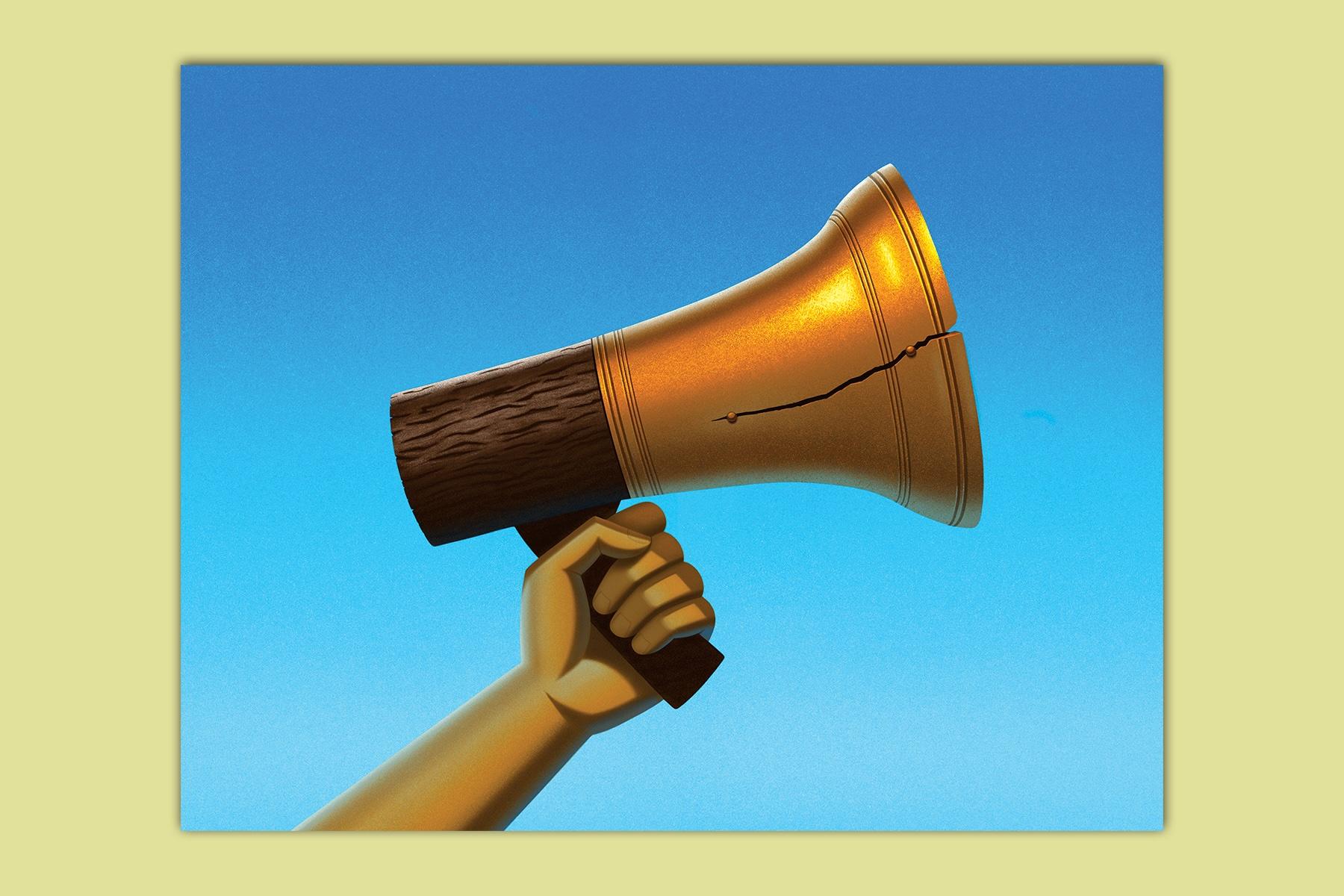Share As A Gift
Share a paywall-free link to this article.
This feature is only available for subscribers.
Start your subscription for as low as $4.95. Already a subscriber?

WE KNEW THIS would be hard. But as the litany of harms rolling out of the White House grows, so has the creeping sense that our efforts to help are inadequate. Sure, we may know the drill to counter these assaults on people and our civic norms: Contact elected officials, offer support to those most impacted, donate, pray, take breaks, and jump back in. But in the face of an administration increasingly comfortable with authoritarian tactics — spreading disinformation, expanding executive power, silencing critics, scapegoating minority communities, detaining and deporting immigrants with no due process, and hamstringing independent institutions — is any of it really enough?
In early April, Sojourners editor in chief Betsy Shirley took these questions to Jarvis Williams, a pastor-turned-pro-democracy-organizer who shifted careers after recognizing that many of the prayer requests his congregants whispered to him were rooted in pain stemming from public policy decisions. His desire to respond eventually led him to join the Horizons Project, a nonprofit that aims to strengthen the ecosystem of different groups working for social change, including veterans, Indigenous organizations, faith communities, racial justice activists, union members, and business leaders. In their conversation, Williams shared his strategies to avoid feeling overwhelmed, insight about where Christians can make the most impact, and some pastoral tough love for those of us prone to forget that America’s problems didn’t start with a particular politician or election cycle. — The Editors
Betsy Shirley, Sojourners: As a pro-democracy organizer, how would you describe what’s happened in the U.S. in the past few months?
Jarvis Williams: If I’m talking with Christians, I would talk about the inability of us as a political community to demonstrate equal concern for all people. We have forgotten how powerful sharing is. We have created a political demonstration of the refusal to keep striving to share what we have.

I notice you’re not using political words like “constitutional crisis,” “executive overreach,” “authoritarianism,” or “fascism.” Why?
I say this as someone who has taken my licks of failures in this regard: Being smart isn’t using the buzzwords — it’s communicating what’s at stake in people’s lives when they don’t have an opportunity to share in the decision making, but they share in the consequences when these things go awry. Everyone understands that. Sometimes in our effort to be rigorous, we forget that the most powerful ideas are usually simple.
I know people want the term that they can research, right? If I said, “We’re in a racial authoritarian moment,” you could see who wrote about that and how they describe it. There’s some value there. Yet I don’t think those terms get at the human element of a crisis that is playing out in real time with how people think they have to make certain kinds of choices, be in relationship to each other, [or] organize their efforts.
Louis Brandeis wrote that the most important office in a democracy is the office of citizen. We have failed to treat it as such. The consequences of people being in office and being ill-equipped to do the duties of that office are evident in terms of how we are acting as a political community.
What does the movement to fix this failure look like? Is it marching in the streets?
Let me try to get at it this way: Before there was a national conversation [about] health care for all, there were people who went to medical school ... and set up offices in areas in the South where health care was not being given to all people.
Similarly, before we had civil rights law, there were lawyers — Black, white, Jewish, etc. — who started thinking about why certain populations aren’t able to get certain rights and what it would take to fix that.
The same could be said of clergy: You had [some clergy] fighting to make sure segregation is the law of the land in the South, and then you get a cascade of [other] voices who say, “God is calling us to demonstrate what the faith requires of us, and here is what it looks like.” There were countless pastors who were white who fought with their churches regularly and lost their jobs. They demonstrated in real time what it meant to walk by faith.
There are always people nudging against the conditions and the confinements of the day. [Today] there are pastors actively trying to make their church board diverse. They’re not calling it DEI — they’re trying to express their faith commitments. There are churches trying to give care to people who live alone, to make sure that the grass is cut and they have groceries. There are wonderful people giving expressions of love and care all the time.
If you forget them, then you disrespect the day-to-day care people give, the day-to-day fight to make democracy and justice real, and the day-to-day fight to help every kid get educated.
I’m not saying you shouldn’t protest. But this is what I think the church brings to this moment: Twelve people can change a world. We’re not overwhelmed by the scenery, but we are constantly trying to do the next best thing.
You walk by faith in light of the grand events that may be happening around you. Because those snowball effects of your day-to-day activities may become the next grand event. Then you can find ways to do more and better actions. I try to push against the assumption that if you don’t follow [a certain] playbook that somehow you’re not fighting for democracy. I find that offensive to people who do good work all the time.
One challenge with day-to-day activities is that it can be hard for many people to feel like they’re part of a broader movement. How do we fix that?
We have to do better at sharing the good news: Look at what this church, this community, these people did. There are pastors who live in extreme Christian nationalist environments who are committed to articulating messages of peace. Some people would say, “Oh, that’s not a big deal. It’s not really changing anything.” Yet the ability to articulate what the expression of faith should be, even if it seems like it’s not being heard — that’s a tremendous amount of courage.
There are people trying to intimidate migrant workers, to make it scary for people who “look” like they don’t belong — and then there are people of faith who have vigilance, prayer, and watch practices. They are trying to ensure that the terror doesn’t happen. There isn’t an impact report, but they are trying to fight in real time.
How would you advise Christians to think about where to invest their time and efforts?
Faith leaders can offer those they lead a more expansive view of how Christian stories can help them see the moment they’re in.
A friend was trying to think about the threat of violence in his community. Their church was more invested in “We’ve got to give God our gifts, our time.” I told the story of Cain and Abel because it’s the first time in the biblical story where you get the idea of somebody giving an offering to God. Interestingly enough, the character who gives it [later goes and kills] his brother. It’s a story that helps us struggle with how Christians have a habit of hurting our brother in private and trying to make gestures to God in public.
What does that mean for us? Well, do you think you can come to church and give your tithes if you’re not paying attention to what happens to deportation and immigration in your [area]? Do you think you can do that when your community has a police force that’s preying on poor people?
My friend experimented with this story, and it created a watershed moment for some of his people. They started raising money to support a local group who was trying to make sure that their sanctuary cities and community had more resources to make sure that people were not harmed. That’s what happens when the story that people have confidence in gives them a [new] window into the world.
I like how you expand what counts as activism and being part of a “movement.” How else can people get involved, especially if they’re feeling anxious to help?
First, the fact that you care is already expressing activism. So you’re already on the right train; it’s not as if you need to become a new person. Now, are things happening in your zip code that you think are not the best expression of treating humans the way God wants?
When you ask that question, you’ll get “Well, yeah, they don’t pay the sanitary workers” or “We need more men in the school system because our young boys are getting bad outcomes.” You’ll hear people talk about what they care about. Then the question becomes: How do you respond within the system? What could you do? Could you write a letter to the superintendent? [Could you] get other people who care to go to the school board meeting and raise this concern? Do you know people on the city council?
The question [can then] become: If the U.S. Department of Education is cutting resources, what do you think that’s going to do for those kids that you’re saying need extra support? What can you do with the teachers to resist cutting funds? Well, here are some organizations who are trying to do what you care about. Why don’t you check that out?
You’re just walking people into actions that they already want to do [and] care about. It’s already their value structure.

Some people might struggle to see how those efforts connect to big-picture national concerns that are dominating news headlines.
It’s a hard question. Plugging into national organizations is always an option. My reservation is that I’ve noticed that people who are trying to do the big thing sometimes are not even doing the [things in their] backyard — and they are overwhelmed because they assume the big thing fixes the backyard. The problem is the backyard left unattended becomes a jungle. There wasn’t a national movement for white Christian nationalism; there were pastors giving voice to those ideas over decades, writing books and on talk radio. Those practices then [coalesced and were] expressed in national politics.
I would argue particularly for Christians, the agency of one person in their [neighborhood or town] can have ripple effects that you could never quantify. It does no good for you to be talking about justice at the national level while you allow authoritarians to rule your community or allow the police in your community to consistently profile different people.
If you cared about education in your own backyard — and if everybody were doing that work — it’s a lot harder to cut the Education Department by 50%.
Take care of your backyard. Give your best expression to the things you’re directly connected to, and when there’s leftover room, do the next larger thing. If you do it that way, the likelihood that you’re overwhelmed is a lot different because you’re actively watching your impact, your failures, successes. You’re actively moving people who you have influence over. You can’t move the secretary of education, but you can move your school board, your pastor, and your community.
Any other advice you’d offer the anxious and overwhelmed in this moment?
Let me put on my pastor hat for a second: The conflicts visible in the world are conflicts we already have warring within us. If you make the world out to be the monster and you somehow are the angel of light that’s going to save the world and resist, [then] you’re telling yourself a story that’s not even authentic to the Christian faith. The problem we see is a human problem: our capacity to be evil, to be cruel, our capacity to hoard, to steal — our capacity to think there’s security in hoarding rather than sharing. Humanity didn’t just start having these problems with the election cycle.
Christian faith gives you tools to deal with human problems at scale. You are human. You know what seduces you, you know what moves you, you know why you let things go. You know why you are more inclined to not care about [this group] versus that group and [can] challenge yourself to be the light you have to be.
That message feels so small in moments where the problem seems so big, yet it’s imperative for those who profess Christian faith to recognize that human fragility is the condition of the human community. We have responses to that. And the responses you have are enough to give light to a dark world.
America is not special. It’s not immune to the problems of collective living. To make yourself sick because you have problems that every collective community of people has makes me think you’re more guilty of hubris than you ought to be. I hope that the challenges we confront help us to be more human — and sober ourselves from the notion that we are so special and so divine that the challenges of evil, greed, and corruption are not things we have to work on every day.
That’s not popular, but I am a Black man, I represent a group of people who are killed by police more than any other demographic. Who have been targeted for mob violence from church leaders. I still get stopped by police regularly and harassed regularly. I don’t need anyone to tell me about fear and violence and disrespect and talking about your problems that nobody wants to hear. Because I’m coming from that place, that’s why I would say your pain is not special. Calm down. Do the work of building a better world for everybody.

Got something to say about what you're reading? We value your feedback!